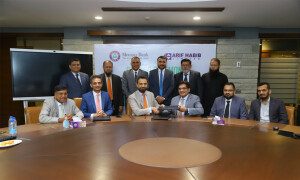What to give the patient who has everything? Well-off Germans in Europe's top economy are increasingly deciding less is more and fasting to cure what ails them. High-end clinics specialising in deprivation rather than pampering are all the rage in Germany, one of the homes of the fasting movement, and in some cases it is even covered by health insurance plans.
Michael van Almsick, 57, is a fasting devotee and, once a year for the last two decades, has spent a month at the Buchinger-Wilhelmi clinic on the shore of scenic Lake Constance on the Swiss border.
Van Almsick starts each day with a spartan breakfast comprised solely of herbal tea, has a fruit juice for lunch, takes a two-hour walk in the afternoon and tucks into a thin broth and a bit of honey at dinnertime. He washes it all down with at least two litres of water daily.
"Try it for a week, just a week. After that you'll see," he says with a smile.
Van Almsick runs a large public relations firm in Munich which will be promoting concert dates in Germany for the Rolling Stones on their summer tour.
He has come to Buchinger-Wilhelmi to tackle a chronic obesity problem and the litany of ailments that accompany it.
So out goes the medication for hypertension, in exchange for a regimented crash diet.
That means no more than 200 to 250 calories per day, about one-tenth the recommended daily intake for a middle-aged adult.
A 10-day stay at the clinic costs around 2,500 euros ($3,450) in a standard room but can run much more with extras.
Otto Buchinger (1878-1966), for whom the facility is named, experimented with fasting to treat rheumatoid arthritis, an affliction that forced him to quit his post as a navy
physician in 1917 during World War I.
A century later, his fasting method is the most widely used in Germany.
For its proponents, fasting helps prevent heart disease and treat asthma, arthritis, chronic digestive diseases, some chronic respiratory infections and even depression.
Medical experts warn that like any extreme change in habits, fasting should be practised in moderation under a doctor's supervision and expectations for dramatic long-term health benefits should be kept in check.
Few randomised controlled trials with large sample sizes have been completed on the subject. However one published by the Lancet in 1991 established a beneficial effect of fasting on rheumatoid
arthritis.
Others have pointed to the positive impact of fasting on various health issues.
"Fasting stimulates the body's own regenerative powers," said Francoise Wilhelmi de Toledo, the managing director of the clinic, which also has a location in sunny Marbella, Spain.
"The Ueberlingen clinic has been around for 60 years and the Marbella location for 40 years. Each year we have 3,000 to 3,500 patients at each establishment, which means 250,000 fasting cures without complications - it's not a scientific study but it's a statistical fact," the clinic's chief doctor, Stefan Drinda, said. Heal thyself
Respected news weekly Der Spiegel dedicated a favourable cover story to the practice in 2011 and a book on the subject by a former employee of the clinic, Hellmut Luetzner, has sold more than two million copies in Germany since it was published in the 1970s.
"German society blazed a trail," Wilhelmi de Toldeo said. "You never find anyone any more who tells you that fasting is abnormal."
In a country that has long embraced alternative medicine, fasting is researched and taught in university hospitals in German cities such as Essen, Jena and Berlin.
The Charite hospital in the German capital has offered supervised fasting for 50 years, where patients can undergo a 12- to 14-day programme paid for, at least in part, by their health insurance.
"Herbs, organic nutrition, vegetarian diets, yoga, living healthily - we Germans are a little obsessed," said Andreas Michalsen, who runs the natural healing department at Charite.
He noted that the 19th century German Romantics pioneered a "belief in the power of self-healing" and "Lebensreform" (life reform) which advocated a back-to-nature lifestyle as a corrective for rampant industrialisation.
"The situation we have today of swallowing high-calorie foods at regular intervals - you have to see that this is something new in the history of human evolution," Michalsen said.
He said that for all the new medications to treat common modern diseases, many are withdrawn from the market each year due to an abundance of side effects.
"The older people get, the more you see these health conditions," Michalsen said.
"I am absolutely convinced that in 10 years, fasting will become more and more important simply because mainstream medicine does not always have an answer to give."
BR100
12,214
Increased By
488 (4.16%)
BR30
38,171
Increased By
1794.1 (4.93%)
KSE100
113,775
Increased By
4262.2 (3.89%)
KSE30
35,992
Increased By
1478.5 (4.28%)

























Comments
Comments are closed.